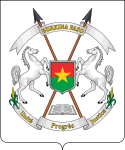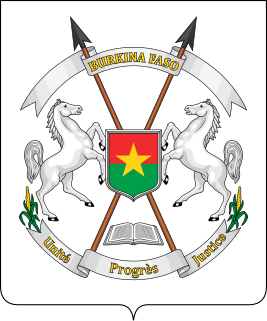
The Politics of Burkina Faso takes place in a framework of a semi-presidential republic, whereby the Prime Minister of Burkina Faso is the head of government, and of a multi-party system. The President of Burkina Faso is the head of state. Executive power is exercised by both the President and the Government. Legislative power is vested in both the government and parliament. The party system was dominated by the Congress for Democracy and Progress (CDP) until the 2014 Burkinabé uprising. Since then, the CDP has lost influence. The Judiciary is independent of the executive and the legislature. The Economist Intelligence Unit rated Burkina Faso a "hybrid regime" in 2019.

The history of Burkina Faso includes the history of various kingdoms within the country, such as the Mossi kingdoms, as well as the later French colonisation of the territory and its independence as the Republic of Upper Volta in 1960.
In government, unicameralism is the practice of having a single legislative or parliamentary chamber. Thus, a unicameral parliament or unicameral legislature is a legislature which consists of a single chamber or house.

Blaise Compaoré is a Burkinabé politician who was president of Burkina Faso from 1987 to 2014. He was a top associate of President Thomas Sankara during the 1980s, and in October 1987, he led a coup d'état during which Sankara was killed. Subsequently, he introduced a policy of "rectification", overturning the leftist and Third Worldist policies pursued by Sankara. He won elections in 1991, 1998, 2005, and 2010 in what were considered unfair circumstances. His attempt to amend the constitution to extend his 27-year term caused the 2014 Burkinabé uprising. On 31 October 2014, Compaoré resigned, whereupon he fled to Ivory Coast.

Jean-Baptiste Philippe Ouédraogo, also referred to by his initials JBO, is a Burkinabé physician and retired military officer who served as President of Upper Volta from 8 November 1982 to 4 August 1983. He has since mediated a few national political disputes and operates a clinic in Somgandé.

The Congress of the Dominican Republic is the bicameral legislature of the government of the Dominican Republic, consisting of two houses, the Senate and the Chamber of Deputies. Both senators and deputies are chosen through direct election. There are no term limits for either chamber.

The Congress for Democracy and Progress was the ruling political party in Burkina Faso until the overthrow of Blaise Compaoré in the year 2014.

Roch Marc Christian Kaboré is a Burkinabé politician who has served as the President of Burkina Faso since 2015. He was the Prime Minister of Burkina Faso between 1994 and 1996 and President of the National Assembly of Burkina Faso from 2002 to 2012. Kaboré also served as President of the Congress for Democracy and Progress (CDP) until his departure from the party in 2014. He founded the People's Movement for Progress party that same year.

The unicameral National Assembly is Burkina Faso's legislative body. In 1995, it became the lower house of a bicameral Parliament, but the upper house was abolished in 2002. The upper house was to have been restored under the name "Senate" in the June 2012 constitutional amendments. This revision was never executed due to an extended and unresolved political confrontation over the Senate's establishment, which left the country effectively with a unicameral legislature as of the October 2014 constitutional crisis.
Gilbert Noël Ouédraogo is a Burkinabé politician who has been President of the Alliance for Democracy and Federation–African Democratic Rally (ADF-RDA), a political party in Burkina Faso, since 2003. He served in the government of Burkina Faso as Minister of Social Action and National Solidarity from 2000 to 2002 and as Minister of Transport from 2006 to 2013. He was the Fourth Vice-President of the National Assembly of Burkina Faso from 2013 to 2014.
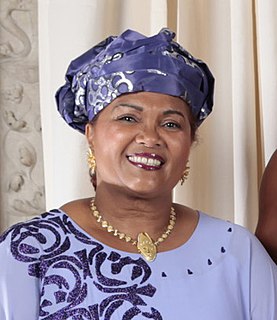
Chantal Compaoré, born Chantal Terrasson de Fougères is the Franco-Ivorian wife of former President Blaise Compaoré of Burkina Faso. Born in the Dabou, Ivory Coast, after becoming the First Lady in 1987 she spent much of her time on charity work in Burkina Faso. Her husband, who came to power in a bloody 1987 military coup, was overthrown in the 2014 Burkinabé uprising. Chantal Compaoré was subsequently forced to flee to her home country, going into exile together with her husband.
Hama Arba Diallo was a Burkinabé politician, diplomat and civil servant. He was minister of foreign affairs of Upper Volta from 1983 to 1984. Diallo, an opponent of President Blaise Compaoré, stood as a candidate in the 2010 presidential election.
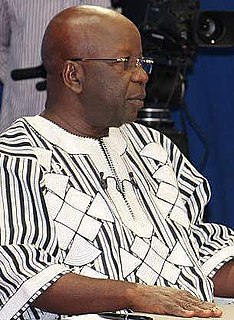
Simon Compaoré is a Burkinabé politician who served as Mayor of Ouagadougou, the capital of Burkina Faso, from 1995 to 2012. He was a prominent member of the ruling Congress for Democracy and Progress (CDP), but he left the CDP and participated in the formation of the opposition People's Movement for Progress (MPP) in 2014. Following the MPP's victory in the 2015 election, he was appointed to the government. He has served as Minister of State for Internal Security since January 2016, and he also held the ministerial portfolio for territorial administration from January 2016 to February 2017.
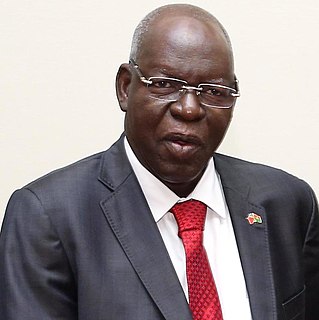
Salif Diallo was a Burkinabé politician who was President of the National Assembly of Burkina Faso from 2015 to 2017. He was a key associate of President Blaise Compaoré from the 1980s to the 2000s, serving in various posts during that period, including as Director of the Cabinet of the President from 1987 to 1989, Minister of Environment and Water from 1995 to 1999, and Minister of Agriculture from 2000 to 2008. He was appointed as Burkina Faso's Ambassador to Austria later in 2008. He also served as Vice-President of the Congress for Democracy and Progress, the ruling party.
Soungalo Apollinaire Ouattara is a Burkinabé politician who was President of the National Assembly of Burkina Faso from 2012 to 2014. Previously he served in the government as Minister of the Civil Service and State Reform from 2008 to 2012.
Luc-Adolphe Tiao is a Burkinabé politician and journalist who was Prime Minister of Burkina Faso from 2011 to 2014.
François Compaoré is a Burkinabé politician. He was Economic Adviser to the President of Burkina Faso, Blaise Compaoré, from 1989 to 2014; he is Compaoré's younger brother.

General elections were held in Burkina Faso on 29 November 2015. The elections were the first national elections in the country since the 2014 Burkinabé uprising and the departure of President Blaise Compaoré, who had ruled Burkina Faso for 27 years. The party of former President Compaoré, the Congress for Democracy and Progress, was banned from presenting a presidential candidate in the presidential elections but was still able to participate in the parliamentary election.

The Burkinabé uprising was a series of demonstrations and riots in Burkina Faso in October 2014 that quickly spread to multiple cities. They began in response to attempts at changing the constitution to allow President Blaise Compaoré to run again and extend his 27 years in office. Pressure for political change came from civil society and in particular from the country's youth. Following a tumultuous day on 30 October, which included the involvement of former Defence Minister Kouamé Lougué and the burning of the National Assembly and other government buildings as well as the ruling Congress for Democracy and Progress party's headquarters, Compaoré dissolved the government and declared a state of emergency before eventually fleeing to Côte d'Ivoire with the support of President Alassane Ouattara.

A constitutional referendum has been planned to be held in Burkina Faso since 2019. Shortly before his reelection in November 2020, President Kaboré, who first initiated the project for a new constitution as part of his 2015 campaign, called for the referendum to be held in 2021. If approved, the new constitution would end the Fourth Republic created in 1991.

